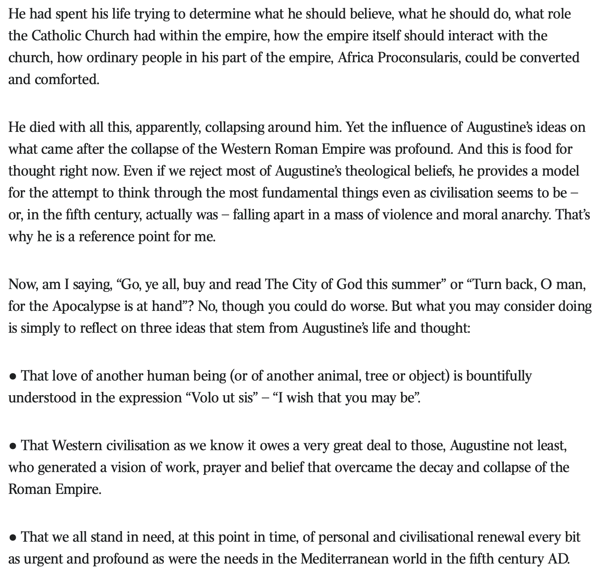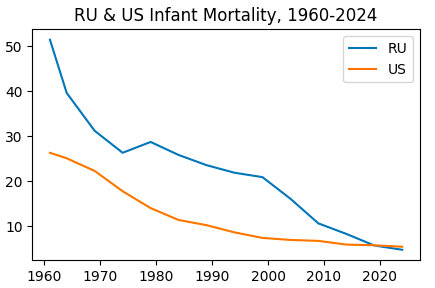| ❝ | That Western civilisation as we know it owes a very great deal to those, Augustine not least, who generated a vision of work, prayer and belief that overcame the decay and collapse of the Roman Empire. |

| ❝ | That Western civilisation as we know it owes a very great deal to those, Augustine not least, who generated a vision of work, prayer and belief that overcame the decay and collapse of the Roman Empire. |

Good grief! They’re still there! Kind-of.

The notebook figures don’t seem to load, nor any details from Gorman’s map. Still, that was more than I expected to find for a web project from 1993, with updates made from grad school into 1995.
This work was from the wonderful undergrad research lab I joined in my junior year. Profs. Bernie Carlson & Mike Gorman were mapping Bell & Edison’s different paths to inventing the telephone.
And wow, some of it’s still there, sporting 1995 “Netscape-specific” web technologies!
Of course a better site now is the Library of Congress
In case I’m ever blessed with teaching again, “The Truth Box” seems a great follow-up to “New Eleusis”, an exercise I inherited from my old undergrad advsior:
They could shake the box, smell the box, remove the sticks, whatever; the only thing they could not do was to open the box or do anything that would cause the box contents to be visually revealed. Their job was to tell me, after eight minutes, what they thought was in the box, and why. I explained that developing good reasoning was very important.
…
The next step was to ask students what would increase their level of certainty about what was in the box. Soon, organically, they were reinventing modern science.
~Alice Dreger, The Truth Box Experiment
I had a few undergrad advisors, but I borrowed “New Eleusis” from Mike Gorman of Simulating Science, and re-inventing the telephone from him and Bernie Carlson. I’ve fond memories of the year or two in their “Repo Lab” at U.Va. helping map Bell & Edison’s notebooks, and making them available on this brand new web thing.
| ❝ | If justice is not based on the facts, if principles of justice are not applied universally, there is no real justice. |
Alice Dreger "Darkness’s Descent on the American Anthropological Association", Hum Nat 2011, pp.243-244.

She expands on in the excellent Galileo’s Middle Finger📚.
| ❝ | Infant mortality, the telltale metric that led him to predict the Soviet collapse half a century ago, is higher in Mr. Biden’s America (5.4 per thousand) than in Mr. Putin’s Russia. |
~NYT on [Emmanual Todd & the Decline of the West](https://www.nytimes.com/2024/03/09/opinion/emmanuel-todd-decline-west.html)
The US has infant and maternal mortality problems, but is it this bad, or is it just Russia finally catching up?

But here’s a combined trend using Macrotrend’s data, from 1960-2024 (omitting Russia’s disastrous 1950s). Even this data has the US slowly improving, so the story is Russia catching up.

Possibly relevant: birth rates are similar at 11 & 12 per thousand (Macrotrends).
Either way, Russia is close to the US now, and I’m surprised – my impressions were outdated. But this graph doesn’t seem cause for concern about the US. Comparison to peer democracies might. I’d have to read Todd’s book for the argument.
A specialist in the anthropology of families, Mr. Todd warns that a lot of the values Americans are currently spreading are less universal than Americans think.
Which thought continues:
In a similar way, during the Cold War, the Soviet Union’s official atheism was a deal-breaker for many people who might otherwise have been well disposed toward Communism.
And despite the US haing ~2.5x Russia’s population (per US Census):
Mr. Todd calculates that the United States produces fewer engineers than Russia does, not just per capita but in absolute numbers.
Though this may reflect his values for what counts as productive (my emphasis):
It is experiencing an “internal brain drain,” as its young people drift from demanding, high-skill, high-value-added occupations to law, finance and various occupations that merely transfer value around the economy and in some cases may even destroy it. (He asks us to consider the ravages of the opioid industry, for instance.)
| ❝ | And that’s why mistakes had to be corrected. BASF fully recognized that Ostwald would be annoyed by criticism of his work. But they couldn’t tiptoe around it, because they were trying to make ammonia from water and air. If Ostwald’s work couldn’t help them do that, then they couldn’t get into the fertilizer and explosives business. They couldn’t make bread from air. And they couldn’t pay Ostwald royalties. If the work wasn’t right, it was useless to everyone, including Ostwald. |
Alan Jacobs' Two versions of covid skepticism summarizes a longer piece by Madeleine Kearns. Both are worth reading.
To his quotes I’ll add the core folly Kearns charges both the Covidians and the Skeptics with:
| ❝ |
by making problems that are in essence forever with us seem like a unique historical rupture.
|
Arnold Kling: 2021 book titles show epistemological crisis.
This may fit with a historical pattern. The barbarians sack the city, and the carriers of the dying culture repair to their basements to write.
Though some of this goes back at least to Paul Meehl.
HTT: Bob Horn. Again.
| “ | The Germans decided that discomfort could make them stronger by creating guardrails against a returning evil. |
Michele Norris describes how Germany faces its Nazi past, as a model for how America could face slavery. It turns out they have a long word for it, Vergangenheitsaufarbeitung,
an abstract, polysyllabic way of saying, ‘We have to do something about the Nazis.’
V24g took awhile to get started, and it’s messy and imperfect, but it’s real. Norris lists many examples. One:
Cadets training to become police officers in Berlin take 2½ years of training that includes Holocaust history and a field trip to the Sachsenhausen concentration camp.
Her source:
“[P]olice fatally shot 11 people and injured 34 while on duty in 2018, according to statistics compiled by the German Police Academy in Münster.
… “In Minnesota alone, where Mr. Floyd was killed, police fatally shot 13 people.”
And on the 40th anniversary of the end of WW2, West German President von Weizsäcker, son of a chief Nazi diplomat, said:
We need to look truth straight in the eye. …anyone who closes his eyes to the past is blind to the present. Whoever refuses to remember the inhumanity is prone to new risk of infection.
Writing for IEEE Spectrum, Joanna Goodrich says that Deep Blue beat Kasparov because was just so fast.
The supercomputer could explore up to 200 million possible chess positions per second with its AI program.
But it wasn’t. Fast enough. Not really. IBM didn’t expect to win, just to lose less badly. Kasparov won the first game. Lost the second. Drew three.
In an account I read years ago (Pandolfini?), it came down to psychology. Deep Blue was doing better than expected, and K started to doubt his preparation or understanding.
Then Deep Blue played a move that spooked Kasparov into thinking it was far faster than it really was, and (uncharacteristically) he panicked and resigned.
But the machine itself had panicked. A bug made that move random.
This recent article roughly agrees with my decades-old memory, supplying the bit I forgot about it being a bug.
I was reviewing this old interview with Australia’s Paul Monk, covering Coronavirus, China, conspiracy theories, reckoning, and risk to Pax Americana, as they looked to him in late April.
If nothing else, listen to him open by quoting Thucydides.
tl;dr Monk reviews key plagues from Athens to now, discusses the situation in April, and assesses three different China-did-it theories, and closes by arguing that the West must reckon with China, and it’s behavior during COV-2 has been a wake-up call.
I’ve had the pleasure to work briefly with Paul on argument mapping and critical thinking, and this is a good example of weighing plausibility and evidence.
It’s probably better to listen or read the interview, but here’s my summary of key points.
I’ve summarized Paul’s summary in a table, filling in numbers from Wikipedia or Ancient.edu (example). It seems the Roman plagues are hard to estimate because they lasted so long.
| Plague | When | Where | # Dead | % Pop |
|---|---|---|---|---|
| Athenian | 4th C BC | Athens | ~100K | ~1/4 - 1/3 |
| Antonine | 2nd C | Roman | ~5M | ~1/3 |
| Justinian | 5th C | Roman & Persian | ~25 - 50M | ~1/4 - 1/3 |
| Black | 14th C | Eurasia+ | ~75 - 200M | ~1/4 - 1/3 |
| Smallpox | 16th C | Americas | ~60M | ~95% |
| Great | 17th C | London | ~100K | ~1/4 |
| Spanish Flu | 20th C | Global | ~50-200M | ~2-3%, but young |
Monk does a nice job separating and assessing the China theories for the origin of SARS-COV-2. As of April, but it seems a solid assessment.
First, there’s the utterly mad theories: 5G and control chips. The China theories aren’t like that. That’s key.
Unrestricted War: deliberate leak. This gains plausibility from the 1997 book Unrestricted War by two Chinese colonels who suggested this possibility. So, it’s a viable theory - and important to note it was sensible for people to draw the connection. So, two avenues of assessment:
a. Sanity Check: Why would the Party agree, given grave risks? (a) How could they guarantee they could control it in China? (b) How could they be confident the outside world wouldn’t figure out whodunnit and “there would be hell to pay”? (c) To control in China you’d have to shut down the economy. Why? When you’re trying to dominate economically? Okay, so it would be hugely risky.
b. Evidence: None. [In the meantime we learned a bit more about how sus' they were acting, but Monk was pretty clear on that already. And their actions are pretty likely on the other China theories too. OK, what about biology? A Taiwanese dissident published a paper saying it was a deliberate release … but her claims for that fell apart. Her publishing circumstances were also dodgy. -And as I try to remind people, evidence is a ratio: to count for this theory, it has to be more likely on this theory than on its contenders. -ed]
c. Meta Evidence: some serious right-wing analysts looked at and dismissed this claim. You’d expect them to jump on it if they could. The intelligence communities in AU, NZ, CA, UK, and US all concluded this looks unlikely. Again, being their key job, you’d expect them to jump on it if they could - at least confidentially. But there’s no evidence in leaks or actions that this is considered remotely plausible.
Unintentional Escape A - It came from Wuhan or another lab, but the usual sort of leak. (Hi, I live in Reston. Ebola anyone?) In this variant, the party simply doesn’t know how it got out, takes awhile to figure it out, and when they do realize “Wow, this is serious”, they say so. If the Party had a history of acting responsibly, this might be more plausible. It doesn’t.
Unintentional Escape: B - As before, but once it leaks they think, “This looks bad” and conduct a propaganda campaign to suppress & whitewash. Evidence: they’re definitely conducting a propaganda campaign, including failed attempts to bully Australia and the rest of the WHO into not investigating.
Yes trading with China helped them prosper. Yes, that was good for us too. Yes, it’s middle class grew, and wanted more liberty. No, the Communist Party did not become more tractable. There was a glimmer of hope, and it was quashed.
Monk says it’s time to get consensus of Western & African countries, and tell China, “This cannot work. It can’t work for us and because it can’t work for us, you’re going to realize it cannot work for you. …there’s no other choice."
1918 and WWI led to the Great Depression, which ushered in reactionary politics around the world: Germany, Japan, Italy, El Salvador. We’re seeing signs now, and that threatens the Pax American that made possible “the greatest expansion in average human wellbeing across the planet … over the last [30-70] years ever in history.” To the extent that other countries follow China to say “Our interests are paramount … then we’re back in the 1930s.”
Paul thinks people have become more reflective, and the pandemic has highlighted the need for global solutions and clear thinking. I suspect it’s just Paul.
He has a nice analogy to The Martian though.
A touching, real conversation on faith, death, grief, culture wars, the Christmas season, comparative immigration, and briefly, Thatcher on climate. Underneath, kinship.